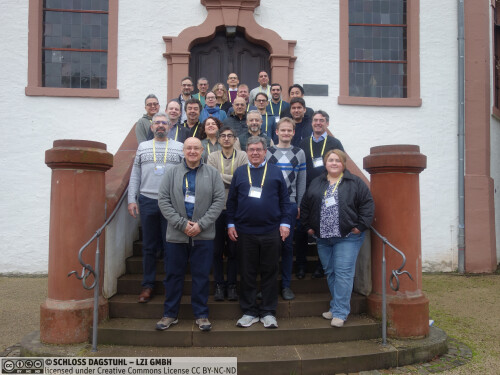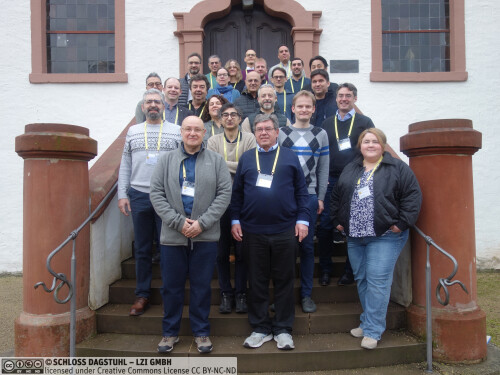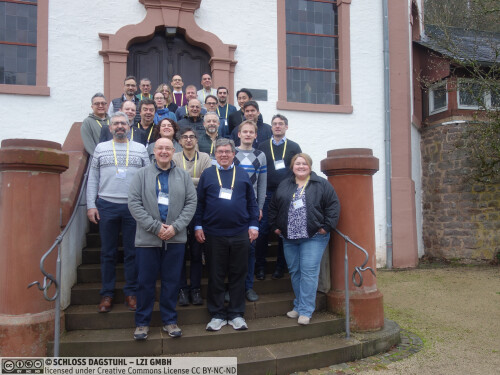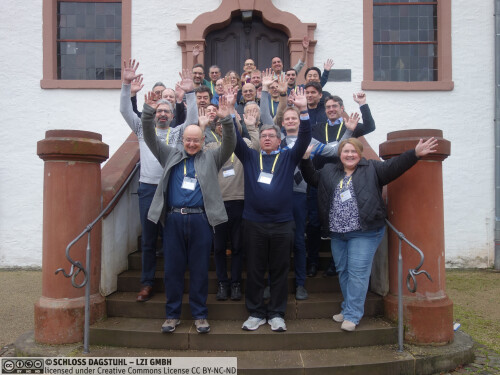Dagstuhl Seminar 24512
Quantum Software Engineering
( Dec 15 – Dec 20, 2024 )
Permalink
Organizers
- Shaukat Ali (Simula Research Laboratory - Oslo, NO)
- Johanna Barzen (Universität Stuttgart, DE)
- Andrea Delgado (Oak Ridge National Laboratory, US)
- Hausi A. Müller (University of Victoria, CA)
- Juan Manuel Murillo (University of Extremadura - Cáceres, ES)
Contact
- Marsha Kleinbauer (for scientific matters)
- Susanne Bach-Bernhard (for administrative matters)
Shared Documents
- Dagstuhl Materials Page (Use personal credentials as created in DOOR to log in)
Schedule
Under the umbrella of quantum information theory, quantum algorithms have been proposed that solve polynomial-time problems for which no classical algorithm solves in that order of complexity. The entry into the NISQ era with the development of the first quantum computers and simulators makes testing such algorithms on real computers possible. This generates new expectations and promotes growing interest in Quantum Computing. Researchers are proposing solutions in the quantum domain to optimize existing algorithmic approaches regarding the number of qubits or circuit depth, propose solutions to manage decoherence and quantum errors, or propose new algorithms for unexplored problems. All these efforts, coupled with the fact that numerous media reports on quantum computing achievements appear, are inviting researchers and practitioners from industry, academia and government to investigate the utility of quantum computing to explore the possibilities it can offer. Some countries have launched specific programs encouraging industry and academia to examine together the applicability in different sectors, the current limitations of quantum technologies and their expected evolution over time. The objective is to prepare for the future uptake of quantum computing in industry in many application domains.
All of the above is evidence that quantum software is already a reality. It is commonly accepted that future software will be hybrid, integrating both classical and quantum components because each quantum algorithm requires classical preprocessing or postprocessing. With this, interest is also beginning to appear from researchers in the field of software engineering. The question arises whether the software engineering body of knowledge acquired over the last decades is applicable in this new computing era. The first forums focusing on the field of Quantum Software Engineering (QSE) have already appeared. Examples are Q-SE at ICSE, QSW at IEEE Services or Q-SET at IEEE QCE. Many interesting works have been presented in these forums on approaching certain software engineering practices now in the context of quantum computing. Topics such as building hybrid software architectures, orchestrating quantum systems, building models that enable automatically generating quantum software, and creating quantum software with better quality attributes are being addressed in these forums.
Although all these works cover interesting specific aspects that different research teams have addressed, there is a need for a deeper reflection on the nature and scope of QSE. This reflection should address questions such as the differences between classical and quantum software engineering, about which features of quantum software can be addressed with the known classical techniques, which features cannot be addressed with classical techniques and why, which classical techniques should be extended or modified to address quantum software development and which new software engineering techniques should be developed to address quantum software from an engineering perspective.
As the area of QSE can be very large, the Dagstuhl Seminar on “Quantum Software Engineering” focused on three main work topics described below.
Quantum Software Design, Modelling, and Architecturing
Each software development methodology embodies its own design artefacts. The question arises as to which design artefacts of the methodologies suit quantum parts in hybrid systems. We may not have such artifacts; we need new ones or known artifacts with new features. In the same way, it could be asked if the conventional classical methodologies are adequate for the development of hybrid systems or if it is necessary to define or adapt our known methodologies. In particular, Model-driven engineering (MDE) has been one of the areas of research that has attracted significant interest over the years and has affected many changes in software engineering. It is now necessary to explore how its principles are adapted to capture the quantum nature of hybrid systems. Some of the contributions that could emerge are new design techniques to address hybrid software development, differentiation and integration of classical and quantum parts during the design, new design objects suitable to the characteristics of quantum computing, specific domain languages for quantum systems, platform-specific models for hybrid systems, reverse engineering of legacy systems for building new hybrid systems or model transformation for hybrid systems. Finally, how to compose hybrid systems from simpler classical and quantum parts is one of the aspects that we should most rapidly address to facilitate the construction of large-scale computational systems involving quantum computation. There are interesting aspects to be addressed here, such as the orchestration of quantum programs, techniques to deal adequately with the classical preprocessing and postprocessing needed by quantum algorithms, and techniques for the interaction between quantum and classical code that do not avoid the benefits provided by service-oriented computing.
Adaptive Hybrid Quantum Systems
Quantum systems combine classical computers with quantum processors to realize hybrid solutions to practical computing problems, including optimization, machine learning and nature simulation. Classical computers are involved in every layer of the quantum stack, from high-level algorithm design to low-level qubit control. The success of quantum computing relies on the seamless integration of classical and quantum components. Optimizing performance requires considering the interactions between different layers of the quantum stack. Thus, the quantum stack demonstrates the inherent hybrid nature of quantum systems.
Quantum system adaptivity is equally essential to the success of quantum computing. Adaptive quantum systems dynamically optimize the use of quantum and classical resources during computation at different levels of the quantum stack. Adaptive systems rely on various technologies to achieve self-* properties, such as self-healing, self-optimizing, self-configuring, or self-adjusting behavior. Key technologies to adapt different levels of the quantum stack include quantum runtimes, parameterized circuits, mid-circuit measurements, dynamic circuits, and circuit weaving to achieve real-time quantum error correction, dynamic calibration of qubit properties, noise mitigation, parameter adjustments in variational algorithms, qubit entanglement routing, or adaptive circuit decomposition. These highly dynamic quantum systems will significantly benefit from software engineering technologies such as feedback loops, models at runtime, assurance at runtime, autonomic systems, digital twins, software-defined infrastructure, and compute & storage clouds.
The rapid proliferation of distributed quantum computing (DQC) amplifies the need for adaptive quantum system technologies to help optimize entanglement distribution across quantum chips, manage network dynamics & latency, and problem decomposition across the network. Adaptive technologies are the key to unlocking the full potential of DQC and enabling the development of large-scale, fault-tolerant, and resilient quantum computers.
Quantum Software Quality Assurance
The construction of software from an engineering perspective always demands that the product obtained has adequate quality attributes. Building a product that is not profitable due to its final characteristics or the cost necessary for its construction is not a valid solution. Quantum software cannot suffer from the lack of these quality attributes. So, it is necessary to guarantee attributes such as reusability or maintainability. How to promote these attributes during the process of building new quantum software is still a task that needs to be addressed. Related to the task of guaranteeing that software meets the required quality attributes is the discipline of software testing. Software testing groups together a set of practices aimed at examining software artefacts and their operation to guarantee that the software has adequate quality attributes and behaves adequately with respect to what it was conceived for. In classic software, many types of testing can be practised, such as white-box, black-box, grey-box, dynamic, or static. It is necessary to determine whether all these testing types are applicable during quantum software development. Also, when dealing with quantum software, it is necessary to study the need for different testing, at least at two levels. On the one hand, testing the classical software that generates the quantum circuit requires further investigation, where classical testing techniques can be applied. On the other hand, testing quantum circuits requires studying new testing techniques. Related to the above, formal methods for ensuring correctness and checking quantum software are also engaging in this topic.
Seminar agenda and development
The seminar agenda started on the first day with a session dedicated to personal presentations, where attendees described their focus area and the related problems that interest them. Next, the rest of the day was devoted to the topic “When Software Engineering meets Quantum Mechanics.” Five interesting talks were given on this topic.
The talks continued on the second day to address “Quantum Software Engineering and its Challenges.” Eleven talks were given on this topic.
From the third day onwards, the seminar focused on discipline-specific group discussions. To build groups of interest for all attendees, the theme of the groups and dynamics were discussed on the morning of the third day.
During each day, coffee breaks were scheduled with sufficient time for interaction and free discussion among the participants. In addition, at the end of the first, second and fourth days, we orchestrated sessions for plenary discussion on topics of relevance to the participants. During the seminar, a board was available for interested attendees or groups of attendees to write down the topics they would like to address during those highly interactive plenary sessions.
During the off-schedule time, the participants enjoyed much social interaction, including long singing sessions accompanied by the excellent guitar player Prof. Hausi A. Müller. This singing was not unrelated to the discipline of quantum computing. Far from it, a song written by Prof. Müller was rehearsed and performed multiple times by the attendees in the renowned Dagstuhl music room and on stage at the closing session on Friday morning. The lyrics of this song are also an outcome of the seminar and are therefore included as a panel discussion at the end of the full report.
 Shaukat Ali, Johanna Barzen, Andrea Delgado, Hausi A. Müller, and Juan Manuel Murillo
Shaukat Ali, Johanna Barzen, Andrea Delgado, Hausi A. Müller, and Juan Manuel Murillo
Under the umbrella of quantum information theory, quantum-relevant algorithms have been proposed. In some cases, their relevance is due to the reduction of the order of complexity with respect to solutions in the classical world. In other cases, the relevance is due to the emergence of innovative solutions, such as obtaining more accurate predictions with less trained neural networks. The entry into the NISQ era with the development of the first quantum computers and simulators now makes it possible to test such algorithms on real computers. This raises new expectations and fosters a growing interest in quantum computing from both research and development.
Lessons learned from classical software engineering highlight that industry will only adopt quantum computing if quantum software can be developed with appropriate engineering procedures. Therefore, quantum software engineering (QSE) is already a necessity. The question arises whether everything learned in the last decades is still applicable in this new era. The interest in this question is evidenced by the growing number of small forums that are organized every year, mostly in the form of workshops associated with conferences such as Q-SE at ICSE, QSW at IEEE Services, or Q-SET at IEEE Quantum Week, to name but a few.
Although the papers presented in these forums cover very interesting specific aspects addressed by different research teams, a deeper reflection on the nature and scope of Quantum Software Engineering is needed. This reflection should address questions such as the differences between Classical and Quantum Software Engineering, which features of quantum software can and cannot be addressed with known classical techniques, which classical techniques should be extended or modified, and which new software engineering techniques should be developed to address quantum software from an engineering perspective.
After a first day dedicated to the topic "When Software Engineering meets Quantum Mechanics", this seminar proposes the following topics to discuss about as a warm start:
- Quantum Software Design, Modelling, and Architecting
- Quantum Software Quality Assurance
- Adaptive Hybrid Quantum Systems
The main outcomes expected from the Dagstuhl Seminar on Quantum Software Engineering are twofold:
- On the one hand, creating a community of researchers with focus, not only in the specific problems that they are facing regarding building Hybrid Systems but also in the Quantum Software Engineering as a discipline and in which they are connected with different problems being addressed by different researchers.
- A roadmap of Quantum Software Engineering providing structure to the discipline and showing the different problems to be addressed in the field, how they connect with each other, the dependencies between them, the different research teams with interest in such problems and an agenda with milestones to be reached in the coming years regarding the development of the field.
 Shaukat Ali, Johanna Barzen, Andrea Delgado, Hausi A. Müller, and Juan Manuel Murillo
Shaukat Ali, Johanna Barzen, Andrea Delgado, Hausi A. Müller, and Juan Manuel Murillo
Please log in to DOOR to see more details.
- Shaukat Ali (Simula Research Laboratory - Oslo, NO) [dblp]
- Paolo Arcaini (National Institute of Informatics - Tokyo, JP) [dblp]
- Antonio Brogi (University of Pisa, IT) [dblp]
- José Campos (University of Porto, PT) [dblp]
- Schahram Dustdar (TU Wien, AT) [dblp]
- Michael Falkental (Kipu Quantum - Karlsruhe, DE) [dblp]
- Sebastian Feld (Delft University of Technology, NL) [dblp]
- Michael Felderer (DLR - Köln, DE) [dblp]
- José Manuel García Alonso (University of Extremadura - Cáceres, ES) [dblp]
- Ignacio García Rodríguez de Guzmán (University of Castilla-La Mancha, ES) [dblp]
- Kostas Magoutis (University of Crete, Heraklion, GR & FORTH-ICS, Heraklion, GR) [dblp]
- Wolfgang Mauerer (Ostbayerische Technische Hochschule - Regensburg, DE) [dblp]
- Andriy Miranskyy (Toronto Metropolitan University, CA) [dblp]
- Anila Mjeda (Munster Technological University - Cork, IE) [dblp]
- Hausi A. Müller (University of Victoria, CA) [dblp]
- Juan Manuel Murillo (University of Extremadura - Cáceres, ES) [dblp]
- Yehuda Naveh (Classiq Technologies - Tel Aviv, IL) [dblp]
- Ricardo Pérez-Castillo (University of Castilla-La Mancha, ES) [dblp]
- Antonio Ruiz Cortés (University of Sevilla, ES) [dblp]
- Shinobu Saito (NTT - Tokyo, JP)
- Ina Schaefer (KIT - Karlsruher Institut für Technologie, DE) [dblp]
- Laura Schulz (LRZ - München, DE)
- Ulrike Stege (University of Victoria, CA) [dblp]
- Robert Wille (TU München, DE) [dblp]
- Manuel Wimmer (Johannes Kepler Universität Linz, AT) [dblp]
- Lei Zhang (University of Maryland - Baltimore County, US) [dblp]
Classification
- Emerging Technologies
- Information Theory
- Software Engineering
Keywords
- Quantum Software Design
- Modelling
- and Architecturing
- Adaptive Hybrid Quantum Systems
- Quantum Software Quality Assurance





 Creative Commons BY 4.0
Creative Commons BY 4.0
